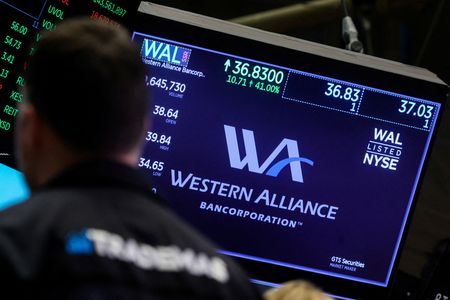 1
1 1
1
By Niket Nishant and Chibuike Oguh
(Reuters) -Shares of U.S. regional lenders jumped on Wednesday on growing investor confidence that the worst of the banking crisis was likely over, following news of strong deposit growth at Western Alliance Bancorp.
Deposits at Western Alliance grew by more than $2 billion in the three months to May 12, the bank said on Tuesday, suggesting customers remained confident of its financial health after three regional lenders failed in recent months: Silicon Valley Bank, Signature Bank and First Republic Bank.
Arthur Hogan, chief market strategist at B. Riley Wealth, said Western Alliance’s deposit growth disclosure was good news for worried investors.
“Western Alliance, one of the most hard-hit banks, came out with a filing showing deposit increase. And as these banks start to show that deposits have stabilized, more confidence is built back into the space in general,” Hogan said.
Western Alliance shares, which are down 41% year-to-date, surged 10% to $34.81, erasing losses recorded over the last two weeks. Other regional lenders closed higher: PacWest Bancorp, whose stock has lost nearly 76% of its value year-to-date, spiked 22%. Comerica Inc gained 12.3%, Zions Bancorp added 12%, KeyCorp rose 8.6%.
The KBW Regional Banking Index rose 7.3%, jumping to its highest level since May 1.
“We’re not going to make it back to pre-crisis levels anytime soon because we do know that the earnings environment for regional banks will still be impaired, but the period of emergency seems to be dissipating and there’s more focusing on the fundamentals,” Hogan added.
Regulators need to work together with the regional banking industry to find policy options that will help bring back consumer confidence and stability to the financial system, said Lindsay Johnson, president and chief executive of retail banking lobby group Consumer Bankers Association, in a speech at the Exchequer Club of Washington, D.C., on Wednesday.
“We call on policymakers to join our industry in helping to reinstall consumers’ confidence in our financial system and stability across the marketplace,” Johnson said.
Regional banks, the largest lenders to the beleaguered U.S. commercial real estate and construction markets, have reduced their exposure to the sector by tightening standards and making fewer loans, according to a Reuters analysis.
Many real estate borrowers face challenges making interest payments in a rising rate environment, while office use declined during the pandemic and property values have decreased on recession concerns.
Deposit flows at U.S. banks, including regional lenders, climbed to $17.16 trillion in the week ended May 3, marking the first increase in four weeks, according to Federal Reserve data.
First Republic Bank’s former Chief Executive Michael Roffler blamed the bank’s collapse on contagion from the failures of other regional banks and said regulators did not express concerns regarding the bank’s strategy, liquidity or management performance.
A total of over $100 billion in deposits were withdrawn from the bank in recent weeks, a time of industry-wide panic about soundness of regional banks, Roffler said in prepared testimony to be delivered at a U.S. House of Representatives Financial Services sub-committee hearing.
(Reporting by Niket Nishant in Bengaluru and Chibuike Oguh in New York; Editing by Deepa Babington, David Gregorio and Lisa Shumaker)